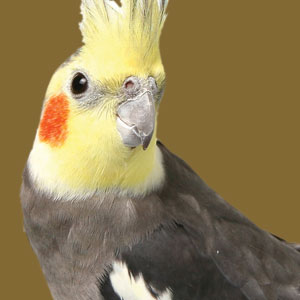
Cockatiels
Fast Facts
Lifespan: 15 to 25 years, depending upon quality of careSize: 12 to 13 inches
Native to Australia
Endangered Status: Least Concern
General Appearance
Cockatiels are one of the smallest members of the cockatoo family, and they're the most popular among bird owners as well. Orange cheek patches, a grey and white body, and a yellow head and crest make the original cockatiel – called the Normal Grey – easy to recognize. However, when people began breeding them as pets, the genes that determine coloring mutated. Now there are about 15 main color mutations in cockatiels including Pied (blotchy grey and white bodies), Emerald and Olive (who tend toward green all over) and even Albino.Behavior and Personality
Cockatiels love being loved! These social babies want to spend quality time with their humans, even if they don't like physical contact all that much. If treated well from a young age, many develop calm demeanors and can form strong bonds with people. Because of these traits, many regard cockatiels as great family birds. While they're less demanding than some of their larger parrot relatives, do not discount the needs of these sensitive babies!The cockatiel's dramatic crest often expresses its mood. When the crest puffs and sticks up, the bird is worked up or startled. A relaxed crest suggests a mellow or comfortable bird, but watch out when a cockatiel flattens his crest against his head – he's not happy and might get violent. You can learn a lot from your 'tiel by paying a little attention to what he's doing with his crest, so listen up!
While some cockatiels (usually males) can learn to talk, many stick to whistling. They often learn songs or mimic car alarms and phone ringtones. These whistlers may sing to entertain themselves, but often they direct their songs at a favorite person, toy, or even their own reflection in a mirror.
Cockatiels enjoy chewing, so toys made from bird-safe materials including cotton rope, cardboard, paper and hard plastic parts are a must. Have a number of toys with different textures, materials and colors on hand so you can rotate out less-loved toys for fresh new fun.
Challenges
'Tiels struggle with night frights more often than other breeds. Whether it's caused by a shadow, noise, draft, or sudden movement, sometimes cockatiels get startled awake and panic. They try to fly upward to escape the perceived danger, crashing into the roof and walls of their cage. Many 'tiels wreak havoc in their cages, knocking perches, toys and food all over as they try to get away. Feathers or wings can get stuck between the cage bars during these panics, and some 'tiels injure their heads as well.These night frights can be traumatic for new parronts, but your distress will not help your bird relax. Talk to him in a calm, comforting voice, turn on the lights, and do a head-to-toe check for injuries. Keeping your bird's cage in a peaceful, low-lit place will help prevent night frights, as will partially covering the cage at bedtime. Knowing that night frights are possible and taking precautions against them is an important step toward keeping your cockatiel safe.
Fun Facts
- Do not let 'tiels' small size fool you; these babies need lots of room to move around. A spacious bird cage with ½" bar spacing is best.
- Cockatiels require a varied diet. Include pellets, seeds and nuts as well as lots of fresh fruits and veggies! Be sure to check that a food is bird-safe before feeding.
- Sometimes other birds intimidate sensitive cockatiels, so if you plan on housing your birds together, be sure to introduce them slowly and with constant supervision.
Caring for these beautiful, bright babies can enrich your family's life. From their endearing whistling to their charming crests, cockatiels bring years of affection and joy to their people. If you're looking for a long-term friend, see how you feel about a 'tiel!
Discover More!
My First Bird: What Kind of Bird Should I Get?My First Bird: The Complete Guide to the Best Pet Bird Cages
Bird Chewing
How to Prevent Boredom in Your Bird
Return to Bird Articles


